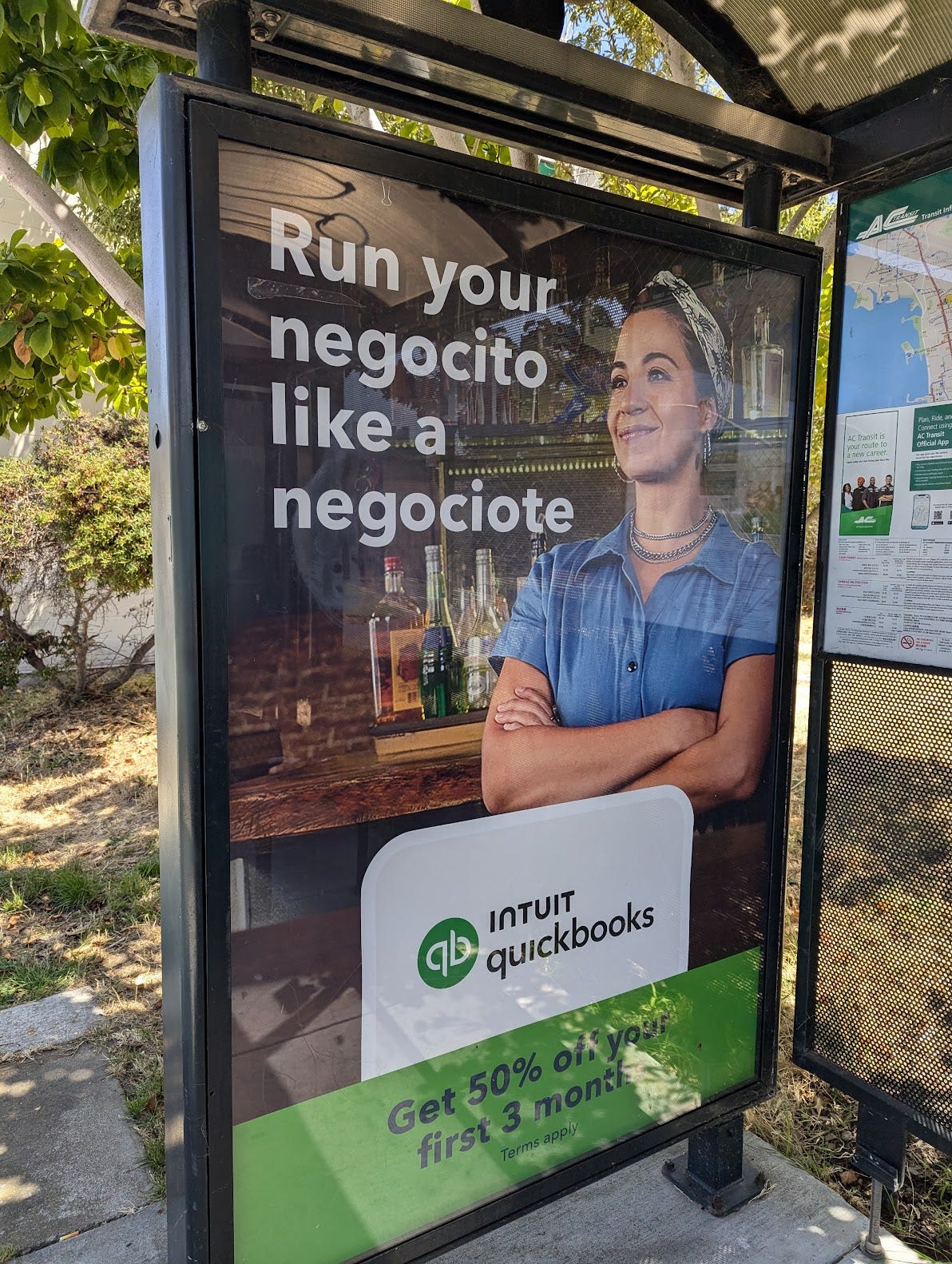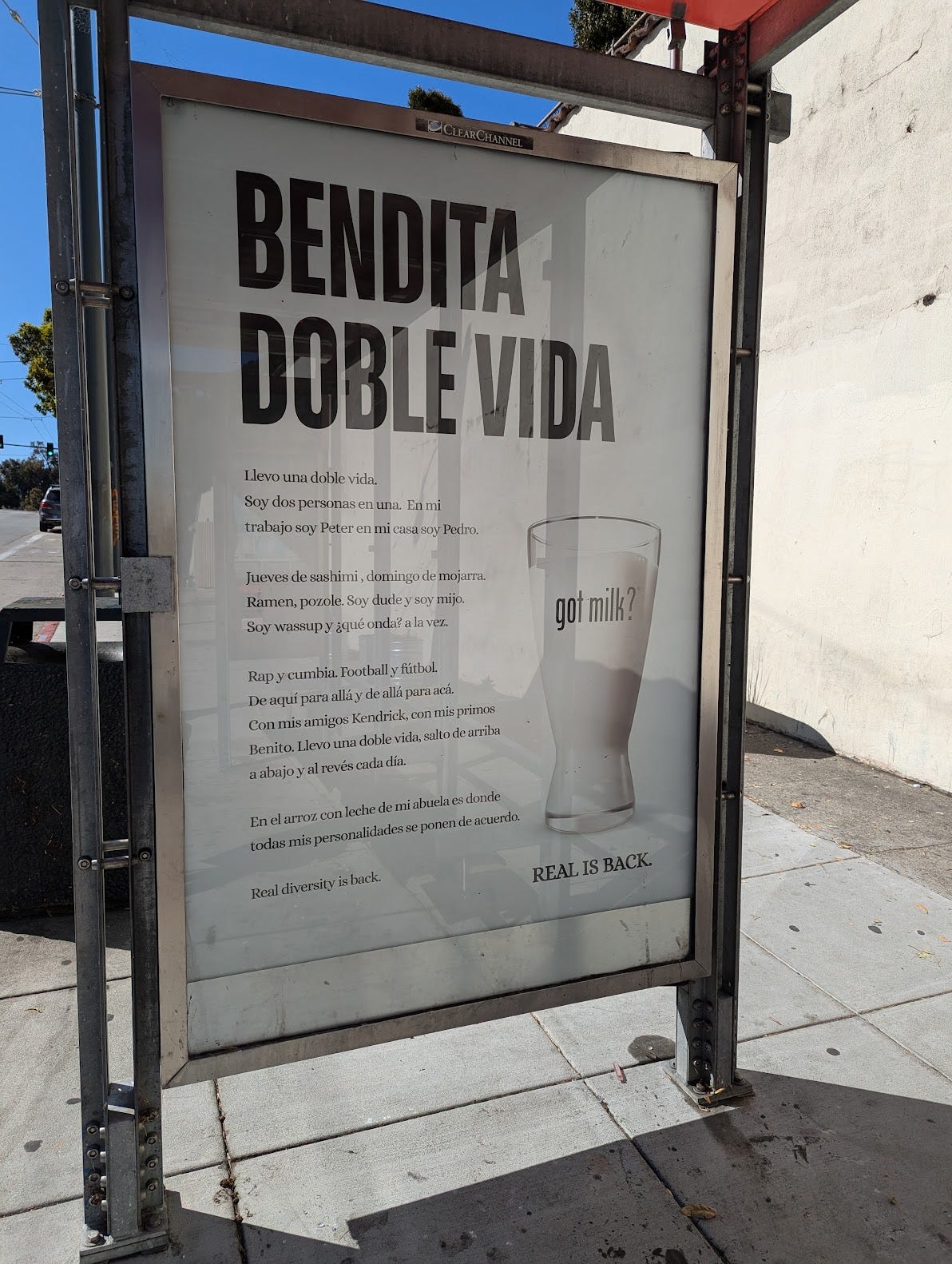Spanglish
Ads that communicate en dos idiomas.
Spanish-language advertising is nothing new here in California. Spanish speakers have lived in the state since long before English speakers arrived — we were a Spanish colony, then part of Mexico — and according to the 2020 U.S. Census nearly 40 percent of the state’s population has Mexican or Central American roots. Roaming around the Bay Area I see all-Spanish public-information ads nearly every day on public transit, at bus stops, or on billboards. Occasionally a major brand will target the Spanish-speaking market with an all-Spanish-language ad, as McDonald’s did this summer with “Abuelita,” which promoted the seasonal Grandma McFlurry dessert.
Recently, though, I’ve noticed a newish trend: ad copy that seamlessly blends two languages, Spanish and English, in the informal conversational idiom known as Spanglish. (The portmanteau was first recorded in 1933; Spanglish was the title of a 2004 film starring Paz Vega and Adam Sandler.)
Here’s what I’m talking about.
“Run your negocito like a negociote”

I love this ad! It’s not just the naturalness of the phrase, which is frankly delightful. That’s how fluently bilingual speakers speak, blending an English verb phrase here and a pronoun there with a couple of Spanish nouns.
In the ad, though, they aren’t just any Spanish nouns; they’re two forms of negocio — “business” — suffixed with -ito and -ote.
Even if you don’t speak Spanish you’re probably aware of the diminutive suffix -ito, as in burrito and taquito. Spanish also has augmentative suffixes like -ote, which transform words into their larger version: grande means “large,” while grandote means “extra large.” You know this one, too — the alter ego of the fictional Alonso Quijano is Don Quijote (also spelled Quixote): “big, aggrandized Quijano.” (Quijano is an actual surname that may derive from a Spanish word meaning “animal jawbone.”)
Sure, you could say the same thing in English: “Run your small business like a big business.” But that’s ho-hum. The Spanglish version is poetry.
It turns out that this campaign, which appears to have been created by Intuit’s in-house agency, is two years old and is called “Think Ote” (think big). The original ads were anchored by Mexican soccer star Javier “Chicharito” Hernández. He may have been selected for his celebrity, but I can’t help thinking his -ito nickname helped a little. Hernández’s father was called “Chícharo” — pea — because of his green eyes; “Chicharito” means “little pea.”
“Bendita doble vida”
The California Milk Processor Board committed some linguistic fouls with its original Spanish-language ads back in the 1990s. The English slogan was, famously, “Got Milk?” But the direct translation into Spanish meant “Are you lactating?” and the ads’ main premise — oops, you ran out of milk — appalled the Latina mothers the ads were targeting. They would never. (The board finally settled on “Familia, Amor y Leche”: “Family, Love and Milk.”)
A new campaign demonstrates how much has changed since those early days. The general campaign retains the “Got Milk?” slogan and boosts it with “Real Is Back.”1 The English-language outdoor ads I’ve seen around San Francisco are bold and cheeky (“Breakfast: The Real Happy Hour”). But the lone Spanglish ad I’ve spotted strikes a more verbose and sentimental note that’s also charming and affecting:

The Spanish text reads:
BENDITA DOBLE VIDA
Llevo una doble vida.
Soy dos personas en una. En mi
trabajo soy Peter en mi casa soy Pedro.Jueves de sashimi, domingo de mojarra.
Ramen, pozole. Soy dude y soy mijo.
Soy wassup y ¿qué onda? a la vez.Rap y cumbia. Football y fútbol.
De aquí para allá y de allá para acá.
Con mis amigos Kendrick, con mis primos
Benito. Llevo una doble vida, salto de arriba
a abajo y al revés cada día.En el arroz con leche de mi abuela es donde
todas mis personalidades se ponen de acuerdo.Real diversity is back.
REAL IS BACK.
My English translation (with generous help from mija Eliana Agudelo):
AMAZING DOUBLE LIFE [“bendita” literally means “blessed,” but it can also mean other things as well]
I lead a double life.
I’m two people in one.
At work I’m Peter and at home I’m Pedro.Sashimi on Thursday, mojarra [tilapia] on Sunday.
Ramen, pozole. I’m “dude” and I’m “mijo.” [a contraction of mi hijo—my son—that best translates to “mate” or “buddy”]
I’m both “wassup” and ¿qué onda? [“what’s up?” or “what’s shaking?”]Rap and cumbia.
Football and fútbol [soccer].
From here when I’m there and from there when I’m here.
Kendrick with my friends, Benito with my bros. [primos is literally “cousins,” but it’s more like “close friends” here]
I lead a double life, I jump up and down and back every day.In my grandmother’s arroz con leche [rice pudding] all my personalities come together.
Real diversity is back.
REAL IS BACK.
The Spanglish ad could have done a better job with the line breaks, which strike me as random and unrhythmic. But I’m willing to overlook that annoyance because of the richness and specificity of the language. All those details — Kendrick, Benito (Bad Bunny), mojarra, cumbia. And finally: arroz con leche, a comfort food with “milk” — leche — in its very name. It’s nostalgic, it’s nourishing, it’s family.
One more note: When Eliana, who is from Colombia, reviewed the original ad and my translation she singled out “De aquí para allá y de allá para acá.” “For us living in two cultures, it is something we say,” she told me. And she added: “As a bicultural person I love this ad.”
Do not confuse this “real milk” campaign with the sneakily named RealMilk dot com, which hypes the dubious benefits of raw, unpasteurized dairy products. For more on “the explosion in right-wing promotion of raw milk,” see Talia Lavin’s recent The Sword and the Sandwich newsletter.


One of the best parts of my living in California (in the past) was the cultural diversity and the many gifts that other cultures brought there, including language. Not only are 40% of Hispanic or Latino origin, but so many people are 5th- or more generation and are represented at every level of society.
Other states with less “embedded”history often resent seeing Spanish language materials or ads and have stereotyped views of their neighbors of Latin origin.
My college roommate’s parents came from Mexico before she was born. Her brother Enrique’s nickname was Kiki. I loved that, along with the many things I learned from her and her family. So much that many are missing out on, culturally and linguistically.
I find it surprising you don't see more Spanish-language ads on television. I live in Rapid City, South Dakota--hardly a hotbed of cultural diversity, and we probably have more residents with Asian roots than Spanish.
However, when I watch my beloved L.A. Dodgers on mlb.tv, every so often I'm bombarded with Spanish-language commercials throughout the entire game. Some are dubbed from English (very well-done, I might add); others are original Spanish. Somehow, some AI program (I guess) has figured I'm part of their target demographic. Así es la vida, I suppose.
Curiously, friends watching in other states--including California--don't get those commercials.